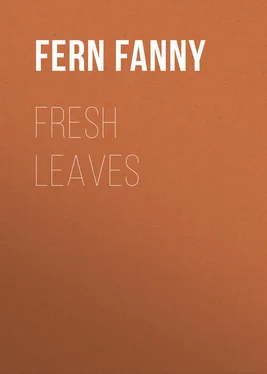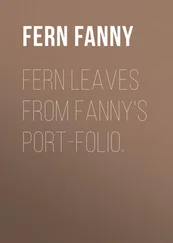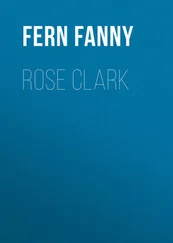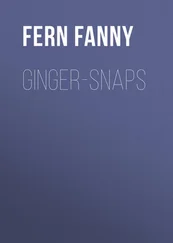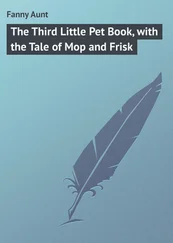Fanny Fern - Fresh Leaves
Здесь есть возможность читать онлайн «Fanny Fern - Fresh Leaves» — ознакомительный отрывок электронной книги совершенно бесплатно, а после прочтения отрывка купить полную версию. В некоторых случаях можно слушать аудио, скачать через торрент в формате fb2 и присутствует краткое содержание. Жанр: foreign_antique, foreign_prose, на английском языке. Описание произведения, (предисловие) а так же отзывы посетителей доступны на портале библиотеки ЛибКат.
- Название:Fresh Leaves
- Автор:
- Жанр:
- Год:неизвестен
- ISBN:нет данных
- Рейтинг книги:5 / 5. Голосов: 1
-
Избранное:Добавить в избранное
- Отзывы:
-
Ваша оценка:
- 100
- 1
- 2
- 3
- 4
- 5
Fresh Leaves: краткое содержание, описание и аннотация
Предлагаем к чтению аннотацию, описание, краткое содержание или предисловие (зависит от того, что написал сам автор книги «Fresh Leaves»). Если вы не нашли необходимую информацию о книге — напишите в комментариях, мы постараемся отыскать её.
Fresh Leaves — читать онлайн ознакомительный отрывок
Ниже представлен текст книги, разбитый по страницам. Система сохранения места последней прочитанной страницы, позволяет с удобством читать онлайн бесплатно книгу «Fresh Leaves», без необходимости каждый раз заново искать на чём Вы остановились. Поставьте закладку, и сможете в любой момент перейти на страницу, на которой закончили чтение.
Интервал:
Закладка:
VISITING AND VISITORS
“When are you coming to spend the day with us?” asked a lady of my acquaintance of another. “Spend the day with you, my dear!” replied the latter; “I should be tired to death spending the day with you; maybe I’ll take tea with you sometime.”
I have often pleased myself imagining how the wheels of society would creak greased with such honesty as that! and yet how many, if they but dared to speak their real sentiments, would make a similar response. Now, I respect that old lady; she had made good use of her years; she probably knew what it was to talk at a mark for hours on the stretch, to some one-idea-d statue, who, with crossed hands and starched attitude, seemed remorselessly exacting of her weary tongue – Give – Give! She knew what it was to long for dinner to reprieve her aching jaws, or, at least, afford them a diversion of labor. She knew what it was to be gladder to see one’s husband home on such a day, than on any other day in the year; and she knew what it was to have those hopes dashed to earth by that inglorious sneak selfishly retreating behind his newspaper, instead of shouldering the conversation as he ought. She knew what it was to have the hour arrive for her afternoon nap (I won’t call it “siesta,”) instead of which, with leaden lids, and a great goneness of brain and diaphragm, she must still keep on ringing changes on the alphabet, for the edification of the monosyllabic statue, who – horror of horrors! – had “concluded to stay to tea.” She knew what it was in a fit of despair to present a book of engravings to the statue, and to hear that interesting functionary remark as she returned it, that “her eyes were weak.” She knew what it was to send in for a merry little chatterbox of a neighbor to relieve guard, and receive for answer, “that she had gone out of town!” She knew what it was to wish that she had forty babies up stairs, with forty pains under their aprons, if need be, that she might have an excuse for leaving the statue for at least one blessed half-hour. She knew what it was to have the inglorious sneak later to tea on that wearisome day than ever before; and on his entrance, blandly and coolly to unfurl a business letter, which, with a Chesterfieldian bow, he hoped the statue would excuse him for retiring to answer; and she knew what it was, five minutes later, to spy the wretch on the back piazza reveling in solitude and a cigar. She knew what it was, when the statue finally – (for every thing comes to an end some time , thank heaven) – took protracted leave – to cry hysterically from sheer weariness, and a recollection of pressing family duties indefinitely postponed, and to think for the forty-eleventh time, what propriety there was in calling her the weaker sex, who had daily to shoulder burdens which the strongest man either couldn’t or — wouldn’t bear. And so again, I say – sensible old lady – would there were more like her!
And yet we would fain hope that, like ours, this is but one side of her experience. We would hope that she knew what it was to throw her arms about the neck of a friend from whom she had no disguises; whose loving eyes scanned – not the wall for possible cobwebs, nor yet the carpet for darns, nor yet the mirror for fly-specks; but her face , to see what sorrow Time, in his flight, had registered there, which by sympathy she could lighten; what joy, which, by sharing, she could increase. We hope she knew what it was to sit side by side with such a one at the frugal meal – sweeter far than the stalled ox, for the love that seasoned it. We hope she knew what it was to lounge, or sit, or stand, or walk, or read, or sew, or doze even, in that friend’s presence, with that perfect love which casteth out fear. We hope she knew what it was to count the hours as they passed, not for their irksomeness, but as a miser tells his hoarded gold; jealous, lest even the smallest fraction should escape. We hope she knew what it was when she unwillingly closed the door upon her retreating form, that shutting it never so securely, kind words, good deeds, loving looks and tones, came flocking in to people the voiceless solitude as with shining troops of white-robed angels.
And we hope she knew what it was to give the cup of cold water to the humble disciple for the Master’s sake. We hope that the door of her house and heart were opened as widely for the destitute orphan, in whose veins her own blood flowed – who could repay it only with tearful thanks – as for those who could return feast for feast, and whose tongues were as smooth as their wine. And finally and lastly, lest we ourselves should be making too long a visit – we hope the old lady had no “best chamber,” with closed blinds; pillows as ruffled as the chambermaid’s temper; forbiddingly polished sheets; smothering canopy; counterpane all too dainty for tumbling; and pincushion, whose lettered words one must not invade, even at the most buttonless extremity! Blessings on the old lady: we trust her carpets were made to be trod on – her chairs to sit down upon – and her windows to open. We hope her house was too small to hold half of her friends, and too hot to hold one of her enemies.
OUR FIRST NURSE
Now sit down, and I will tell you all about it. Charley and I were engaged. Youth comes but once, you know, and if we waited to be married until we could furnish a house in fashionable style – well, you see, we knew too much for that; we got married, and left other couples to grow gray, if they liked, on the distant prospect of damask curtains, gold salt-cellars, and trains of innumerable servants.
Charley did not know the meaning of a “club-house,” and the shopkeepers flashed their diamonds and satins in vain in my face; I never gave them a thought. We had some nice books, and some choice engravings, presented to Charley by an old antiquary who had taken a fancy to him. You might have gone into many a parlor on which thousands had been lavished, and liked ours all the better when you came back. Still, it wanted something – that we both agreed; for no house can be said to be properly furnished without a baby. Santa Claus, good soul, understood that, and Christmas day he brought us one, weighing the usual eight pounds, and as lively as a cricket. Such lungs as it had! Charley said it was intended for a minister.
Well, now it was all right, or would have been, if the baby had not involved a nurse. We had, to be sure, a vague idea that we must have one, and as vague an idea of what a nurse was. We thought her a good kind of creature who understood baby-dom, and never interfered with any little family arrangements.
Not a bit of it!
The very first thing she did was to make preparation to sleep in my room, and send Charley off into a desolate spare chamber. Charley! my Charley! whose shaving operations I had watched with the intensest interest; mixing up little foam seas of “lather” for him, handing him little square bits of paper to wipe his razor upon, and applying nice bits of courtplaster, when he accidentally cut his chin while we were laughing. Charley! whose cravats I had tied to suit my fancy every blessed morning, whose hair I had brushed up in elegant confusion, whose whiskers I had coaxed and trimmed, and – well, any one, unless a bachelor or old maid, who reads this, can see that it was perfectly ridiculous.
Charley looked at me, and I looked at him, and then we both looked at the bran new baby – and there’s where she had us. You might have seen it with half an eye, as she folded her hands complacently over her apron-strings, and sat down in my little rocking-chair, opposite the bed. I felt as though I was sold to the Evil One, as she fixed her basilisk eyes on me when Charley left the room. Poor Charley! He did not want to go. He neither smoked, nor drank, nor played billiards; he loved home and – me; so he wandered up stairs and down, sat with his hands in his pockets staring at the parlor fire till he could bear it no longer, and then came up stairs to get comforted. If you’ll believe it, that woman came fussing round the bed after him, just as if he were infringing some of her rights and immunities.
Читать дальшеИнтервал:
Закладка:
Похожие книги на «Fresh Leaves»
Представляем Вашему вниманию похожие книги на «Fresh Leaves» списком для выбора. Мы отобрали схожую по названию и смыслу литературу в надежде предоставить читателям больше вариантов отыскать новые, интересные, ещё непрочитанные произведения.
Обсуждение, отзывы о книге «Fresh Leaves» и просто собственные мнения читателей. Оставьте ваши комментарии, напишите, что Вы думаете о произведении, его смысле или главных героях. Укажите что конкретно понравилось, а что нет, и почему Вы так считаете.
